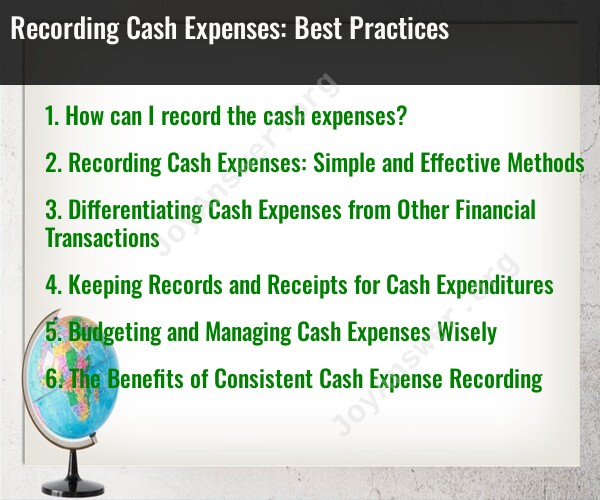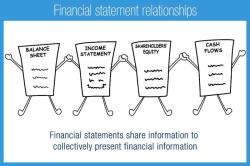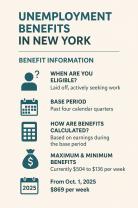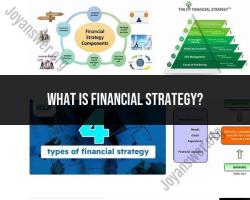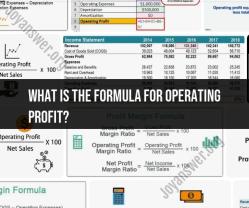How can I record the cash expenses?
Recording cash expenses accurately is crucial for maintaining proper financial records and budgeting. Here are some best practices for recording cash expenses:
Create a System:
- Establish a system for recording cash expenses. This can be as simple as a physical notebook, an Excel spreadsheet, or specialized accounting software.
Use a Petty Cash Fund:
- If your business has frequent small cash expenses, consider setting up a petty cash fund. Replenish it regularly and keep a record of each expense made from the fund.
Save Receipts:
- Always request and retain receipts for your cash expenses. This provides evidence of the expenditure and makes it easier to reconcile your records.
Categorize Expenses:
- Categorize your cash expenses to make tracking and budgeting more straightforward. Common categories include office supplies, meals, transportation, and entertainment.
Record Immediately:
- Record cash expenses as soon as they occur. This reduces the chances of forgetting or losing track of expenditures.
Document Details:
- Include essential information for each expense, such as the date, amount, payee or vendor, purpose, and category.
Maintain Consistency:
- Be consistent in your recording process. Use a standardized format for your records to make it easier to review and analyze expenses.
Reconcile Regularly:
- Reconcile your cash expense records with your bank or petty cash fund regularly to identify any discrepancies or errors.
Use Accounting Software:
- Consider using accounting software or mobile apps that are designed to help you record and track expenses. Many of these tools offer features for scanning and storing receipts.
Backup Records:
- Create digital backups of your records to ensure you have a secure and accessible copy of your expense history.
Separate Business and Personal Expenses:
- If you're managing cash expenses for both personal and business purposes, keep separate records to avoid confusion and tax-related issues.
Understand Tax Deductions:
- Familiarize yourself with tax regulations related to cash expenses. Some expenses may be tax-deductible, so maintaining accurate records can help you maximize deductions.
Seek Professional Guidance:
- If you're running a business or have complex financial transactions, consult with an accountant or financial advisor for guidance on recording and managing expenses.
Periodic Review:
- Regularly review your cash expense records to identify spending patterns, budget variances, and areas where you can cut costs.
Accurate and well-organized records of cash expenses are essential for financial management and reporting. Whether for personal finances or business purposes, following these best practices will help you maintain control over your cash expenditures.
Recording Cash Expenses: Simple and Effective Methods
Recording cash expenses is a simple but important task that can help you to track your spending, manage your finances, and save money. There are a number of different ways to record cash expenses, but some of the most effective methods include:
- Keeping a cash expense journal: This is a simple notebook or spreadsheet where you can record the date, amount, and category of each cash expense.
- Using a budgeting app: There are a number of different budgeting apps available that can help you to track your cash expenses. These apps typically allow you to create categories for your expenses, set spending limits, and generate reports.
- Reviewing your bank statements: You can also review your bank statements to track your cash expenses. However, this method can be more time-consuming, as you will need to manually identify and categorize each cash expense.
Differentiating Cash Expenses from Other Financial Transactions
Cash expenses are any expenses that you pay for with cash or with a check that is drawn directly from your checking account. Other financial transactions, such as credit card purchases and electronic transfers, are not cash expenses.
It is important to differentiate between cash expenses and other financial transactions because cash expenses are more difficult to track and manage. When you pay for something with a credit card or electronic transfer, you can easily see the transaction in your online account statement. However, when you pay for something with cash, you need to manually track the transaction.
Keeping Records and Receipts for Cash Expenditures
It is important to keep records and receipts for all of your cash expenditures. This will help you to track your spending and to verify your expenses if you are ever audited.
Some tips for keeping records and receipts for cash expenditures include:
- Keep a cash expense journal or use a budgeting app to track your cash expenses.
- Save all of your receipts for cash expenditures.
- Scan your receipts and save them electronically.
- Categorize your receipts by expense category.
Budgeting and Managing Cash Expenses Wisely
Once you have started tracking your cash expenses, you can start to budget and manage them more wisely. Here are some tips:
- Set spending limits for each expense category.
- Review your spending regularly and make adjustments to your budget as needed.
- Look for ways to reduce your cash expenses, such as shopping around for better deals and cooking more meals at home.
The Benefits of Consistent Cash Expense Recording
Consistent cash expense recording offers a number of benefits, including:
- Better financial awareness: Recording your cash expenses can help you to become more aware of your spending habits and to identify areas where you can cut back.
- Improved budgeting: Recording your cash expenses can help you to create a more realistic budget and to track your progress towards your financial goals.
- Increased savings: By tracking your cash expenses and budgeting wisely, you can save more money each month.
- Tax preparation: Recording your cash expenses can make it easier to prepare your tax return.
If you are not already recording your cash expenses, I encourage you to start today. It is a simple but effective way to improve your financial situation.
